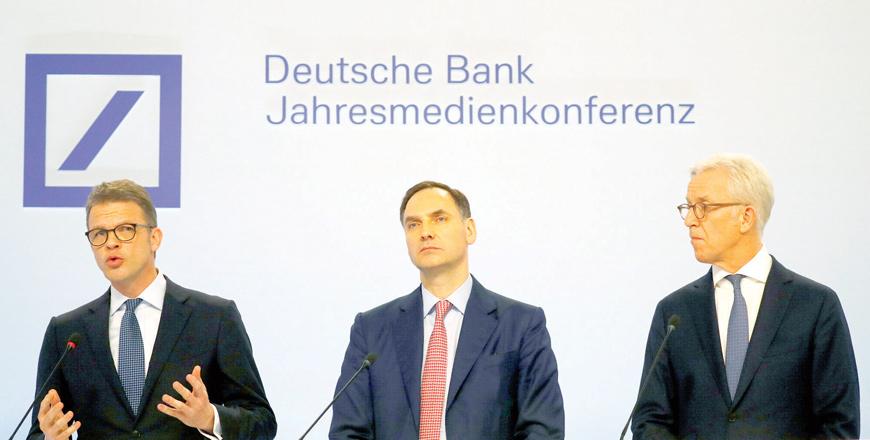You are here
Deutsche Bank seeks to shed risky assets as part of overhaul — sources
By Reuters - Jun 19,2019 - Last updated at Jun 19,2019

The logo of Germany’s largest business bank, Deutsche Bank is seen in front of one of the bank’s office buildings in Frankfurt, Germany, on October 27, 2016 (Reuters photo)
FRANKFURT — Deutsche Bank is aiming to cut up to a quarter of its riskiest assets in the next few years, people familiar with the matter said, shedding more light on how the German lender is trying to overhaul its business and revive profitability.
The plan provides more detail on a restructuring expected since Chief Executive Officer Christian Sewing promised shareholders “tough cutbacks” to turn the bank around after it botched an attempted merger with rival Commerzbank.
The bank’s shares, which have hit record lows in June, have perked up on expectations that a major overhaul is under way.
Deutsche is expected to talk to top investors within days to elaborate on its plans, a person with direct knowledge of the matter said. The group will unveil the strategy in July, other people say.
The bank has struggled to bounce back after the 2008 financial crisis and has been plagued by failed regulatory stress tests, multibillion dollar fines and management upheavals and most recently a failed merger.
Deutsche’s biggest business by revenues is its investment bank, which holds swathes of high-risk assets such as complex derivatives. Cutting back on risky assets would in theory allow Deutsche to hold less capital and use this money for other purposes to try to boost profit.
Under the plan, Deutsche will reduce its so-called risk-weighted assets by between 20 per cent and 25 per cent over the next three-to-five years, the people said, speaking on condition of anonymity.
Risk weighting is where a bank assigns a risk of losses to an asset, such as a derivative or loan. That, in turn, determines how much capital it needs to cover such a loss.
The bank held 347 billion euros ($388.61 billion) in such assets at the end of the first quarter, according to Deutsche’s quarterly results. A 25 per cent reduction would bring assets to about 260 billion euros.
Deutsche Bank declined to comment but said it was working on measures to accelerate its transformation so as to improve its sustainable profitability. “We will update all stakeholders if and when required,” the bank said.
Other changes include shrinking or shutting equity and rates trading businesses outside of Europe. Deutsche is also planning to create a “bad bank” for non-core assets, which can be a way to reduce risky assets over time. In an internal bad bank, risk weighted assets remain on the bank’s balance sheet until they are wound down.
One of the big open questions is how many jobs Deutsche will cut. The bank has already pledged to reduce headcount to under 90,000, from the current 91,463.
Analysts and some investors would like to see a staff reduction of more than 10 per cent for the overhaul to be credible.
Deutsche management is also in flux. Pressure to step down has been building on Garth Ritchie, head of the investment bank, and Sylvie Matherat, chief regulatory officer, according to people with direct knowledge of the matter.
The bank has declined to comment on the possible shake-up.
The revamp will delay further some of the bank’s goals. Deutsche is widely expected to miss its key profitability target — a return on tangible equity of 4 per cent - in 2019.
Swiss banks UBS and Credit Suisse have already restructured by paring down their investment banks and are today on stronger footing, providing hope for Deutsche Bank, analysts say.
But competition is heating up on Deutsche’s home turf. Standard Chartered earlier this year opened its new European Union headquarters in Frankfurt next door to Deutsche’s head office.
The bank aims to take on Deutsche’s core clientele — big German corporations — by offering them services in far flung countries, Standard Chartered CEO Bill Winters told reporters on Tuesday.
Related Articles
FRANKFURT — Deutsche Bank returned to profit in 2018, its first in four years, despite a greater-than-expected loss in the fourth quarter, t
LONDON — Retrenching and cost-cutting European investment banks are on course to lose market share to their bigger US rivals for the 10th st
Arab Bank Group said it had begun legal steps to appeal a US jury ruling which found it liable for financing Islamic group Hamas.

















